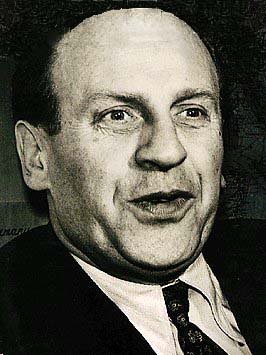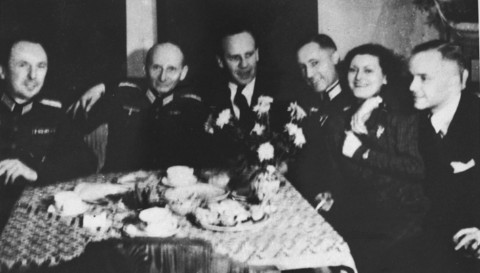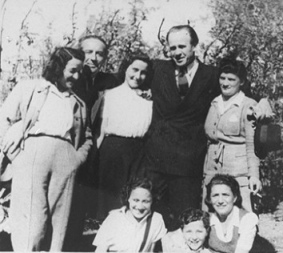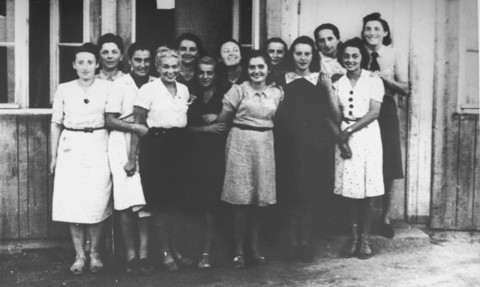Oskar Schindler
(1908 - 1974)
 |
Oskar Schindler was a German industrialist, former member of the Nazi Party and possibly the most famous "Righteous Gentile" who is credited with saving as many as 1,200 Jews during the Holocaust. His story was brought to international acclaim by the 1982 novel Schindler's Ark and the 1993 film, Schindler's List.
Schindler was born April 28, 1908, in Zwittau, Austria-Hungary, what is now Moravia in the Czech Republic. He grew up in a Catholic well-to-do family with all the privileges money could buy.
He married Emilie Schindler at nineteen, but was never without a mistress or two. He had presided over the demise of his family business and become a salesman when opportunity came knocking in the guise of the war.
Never one to miss a chance to make money, he marched into Poland on the heels of the SS. He dived headfirst into the black-market and the underworld and soon made friends with the local Gestapo bigwigs, softening them up with women, money and illicit booze. His newfound connections helped him acquire a factory which he ran with the cheapest labor around: Jewish.
 Schindler (center) with German army officers. |
In December 1939, as occupied Poland was being torn apart by the savagery of the Holocaust, Schindler took his first faltering steps from the darkness of Nazism towards the light of heroism. “If you saw a dog going to be crushed under a car,” he said later of his wartime actions, “wouldn't you help him?”
Before the outbreak of war, Poland had been a relative haven for European Jews - Krakow's Jewish population numbered over 50,000. But when Germany invaded, destruction began immediately and it was merciless. Jews were herded into crowded ghettos, randomly beaten and humiliated, capriciously killed. Jewish property and businesses were summarily destroyed, or appropriated by the SS and 'sold' to Nazi 'investors', one of whom was the fast talking, womanizing, money hungry Schindler.
Not long after acquiring his “Emalia” factory - which produced enamel goods and munitions to supply the German front - the removal of Jews to death camps began in earnest. Schindler's Jewish accountant put him in touch with the few Jews with any remaining wealth. They invested in his factory, and in return they would be able to work there and perhaps be spared. He was persuaded to hire more Jewish workers, designating their skills as “essential,” paying off the Nazis so they would allow them to stay in Kraków. Schindler was making money, but everyone in his factory was fed, no-one was beaten, no-one was killed. It became an oasis of humanity in a desert of moral torpor.
 Schindler with a group of “Schindlerjuden. |
“Beyond this day, no thinking person could fail to see what would happen,” he said later. “I was now resolved to do everything in my power to defeat the system.”
By the autumn of 1944, Germany's hold on Poland had weakened. As the Russian army approached, the Nazi's tried desperately to complete their program of liquidation and sent all remaining Jews to die. But Schindler remained true to the “Schindlerjuden,” the workers he referred to as “my children.”
After the liquidation of the Kraków ghetto and the transfer of many Jews to the Plaszow concentration camp, Schindler used his influence to set up a branch of the camp for 900 Jewish workers in his factory compound in Zablocie and made his now famous list of the workers he would need for its operation.
The factory operated in its new location a year, making defective bullets for German guns. Conditions were grim, for the Schindlers as well as the workers. But Schindler saved most of these workers when he transferred his factory to Brunnlitz (Sudetenland) in October 1944.
 Office workers from the “Emalia” factory. |
He died in Hildesheim in 1974. His extraordinary story might have died with him but for their gratitude.
In trying to answer the inevitable question, why did he do it, one of the survivors said: “I don't know what his motives were... But I don't give a damn. What's important is that he saved our lives.”
“He negotiated the salvation of his 1,300 Jews by operating right at the heart of the system using all the tools of the devil - bribery, black marketeering and lies,” said Thomas Keneally, whose book about this paradoxical man was the basis of the movie Schindler's List.
Perhaps the question is not why he did it, but rather how could he not. And perhaps the answer is unimportant. It is his actions that matter now, testimony that even in the worst of circumstances, the most ordinary of us can act courageously. If Oskar Schindler, flawed as he was, did it, then so might we, and that is reason enough to hope.
Sources: Susan Pottinger and the Life Magazine Hall of Heroes; United States Holocaust Memorial Museum.
Photos also from the Holocaust Museum and The Story of Oscar Schindler
Founded in Germany on January 5, 1919, it was characterized by a centralist and authoritarian structure. Its platform was based on militaristic, racial, anti-Semitic and nationalistic policies. The Nazi Party membership and political power grew dramatically in the 1930s, partly based on political propaganda, mass rallies and demonstrations.
(Gre. Entire Burnt Offering) A term used to refer to the genocidal Nazi policy of exterminating the Jews during World War II.
(Geheime Staatspolizei). The Nazi Secret State Police. The name was created from the first letter of the German name Geheime Staats Polizei. Established in Prussia in 1933, its power spread throughout Germany after 1936. The Gestapo’s chief purpose was the persecution of Jews and dissident political parties. Under Himmler’s direction, the Gestapo was a prime force in the murder of the six million Jews.
The ghetto was a section of a city where all Jews from the surrounding areas were forced to reside. The Nazis revived the medieval ghetto in creating their compulsory “Jewish Quarter” (Wohnbezirk).Surrounded by barbed wire or walls, the Nazi ghettos were often sealed so that people were prevented from leaving or entering. Established mostly in Eastern Europe (e.g., Lodz, Warsaw, Vilna, Riga, Minsk), the ghettos were characterized by overcrowding, starvation and forced labor. All were eventually destroyed as the Jews were deported to death camps.
Brunnlitz was the industrial town in German-occupied Czechoslovakia where Oskar Schindler relocated his Krakow factory in late 1944 as the Soviet Red Army advanced towards Krakow from the east. The weapons factory that Schindler established in Brunnlitz was a sub-camp of the Gross-Rosen concentration camp. Labor camps exploiting Jewish and foreign labor like Brunnlitz were located throughout the Greater German Reich. Brunnlitz, under Schindler, was one of the few camps where Jews were not treated brutally.
The State of the Jewish people, founded in 1948. Also; a name given to the Jewish patriarch Jacob according to Genesis 32.38. In Jewish biblical times, this name refers to the northern tribes, but also to the entire nation. Historically, Jews have continued to regard themselves as the true continuation of the ancient Israelite national-religious community. In modern times, it also refers to the political state of Israel.



No comments:
Post a Comment